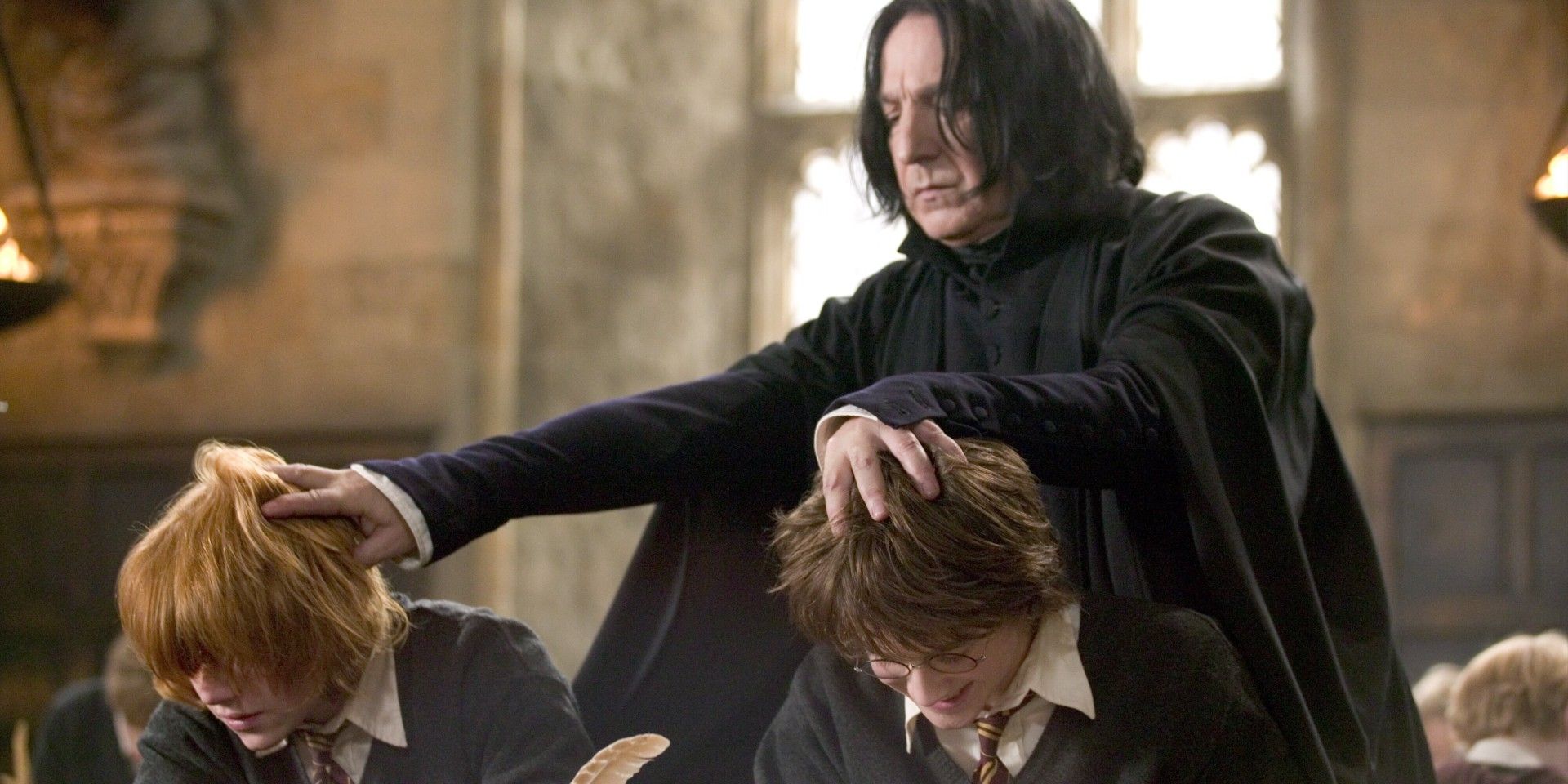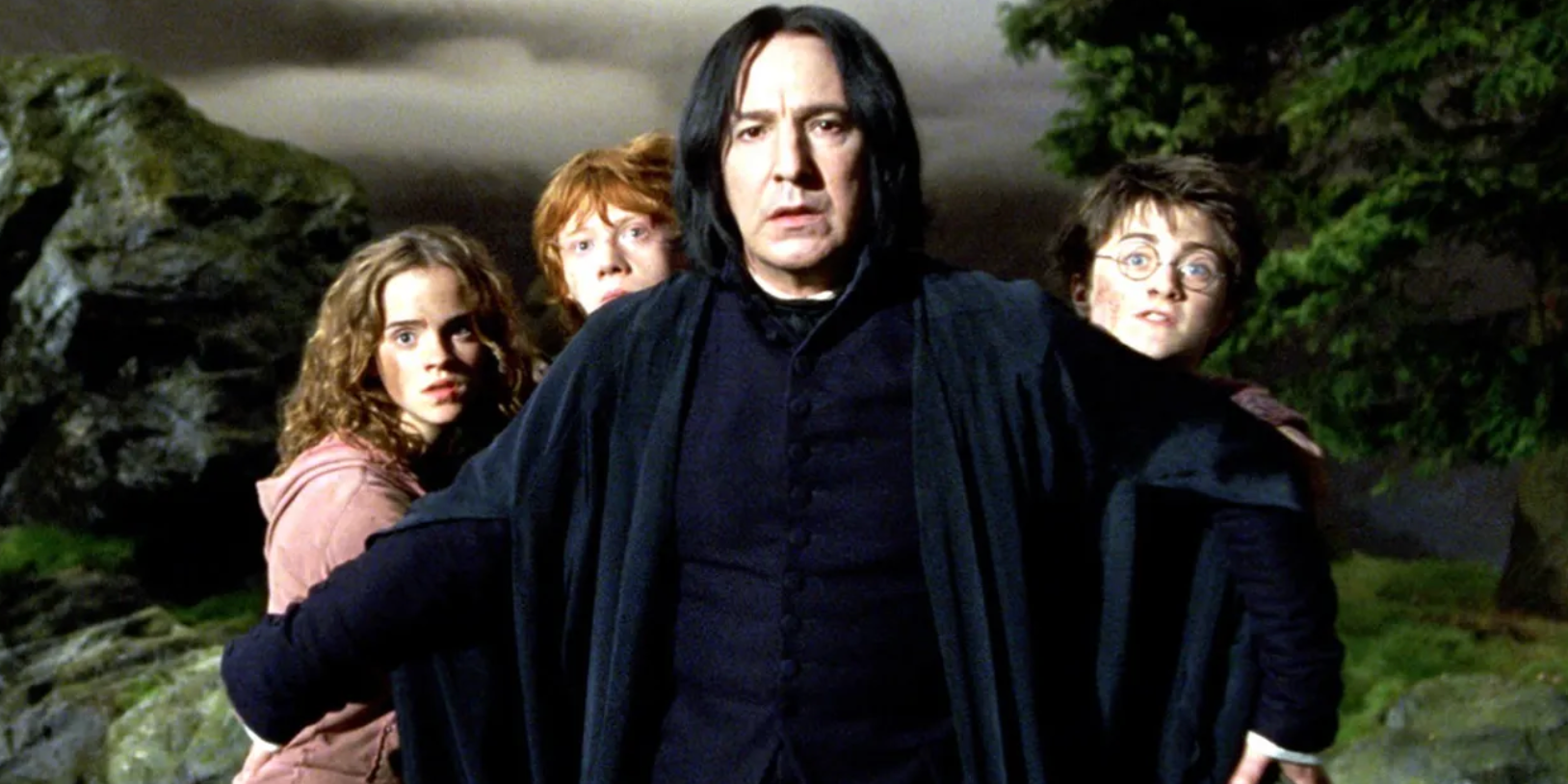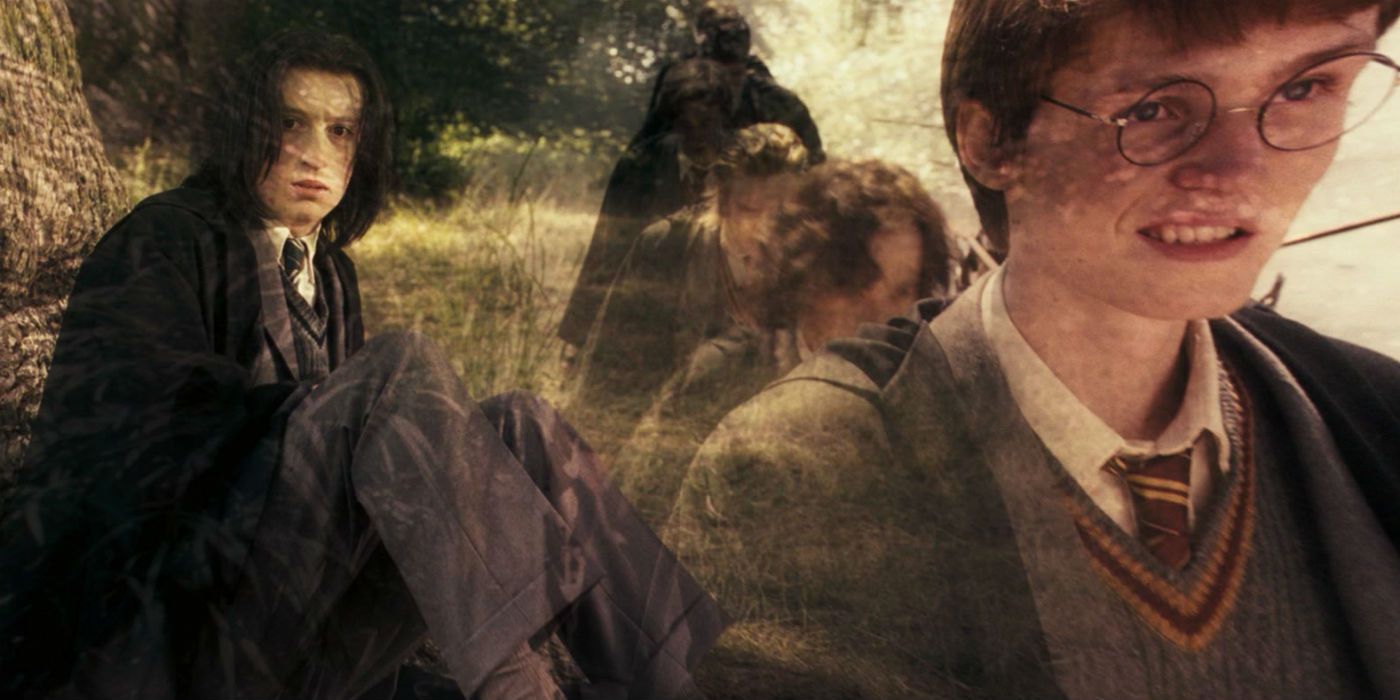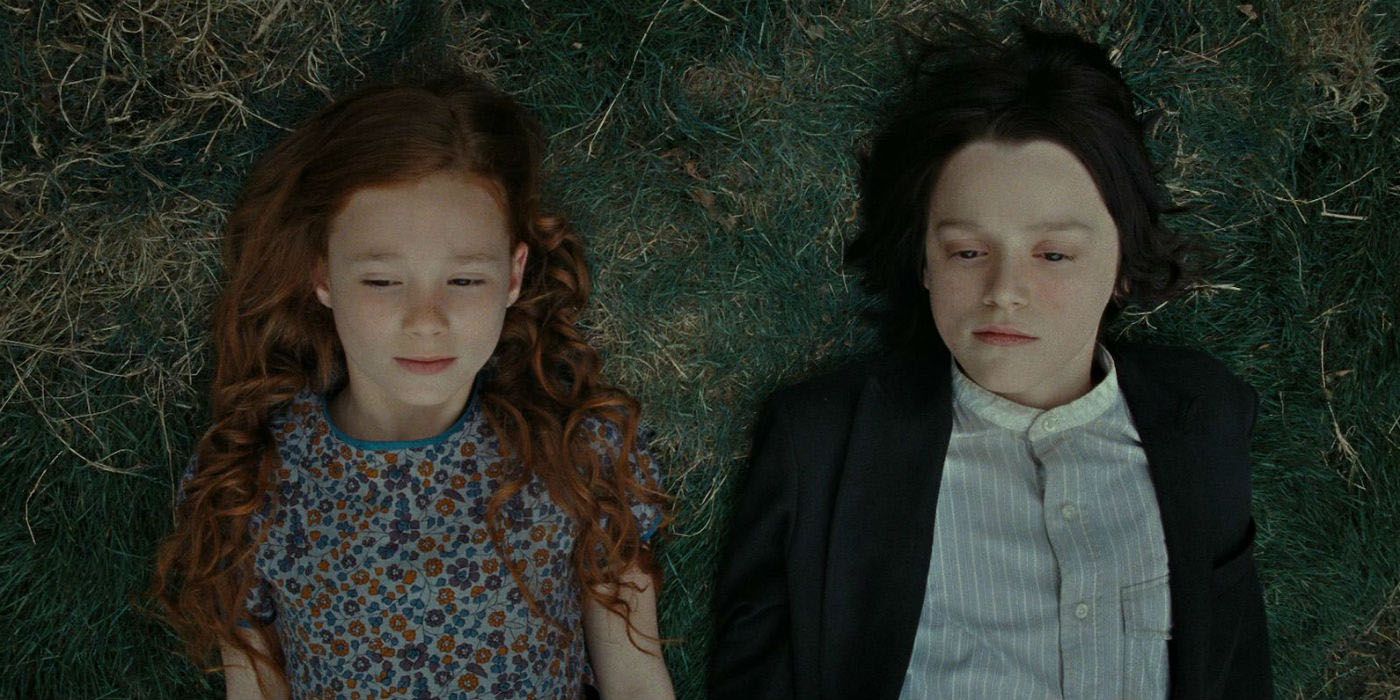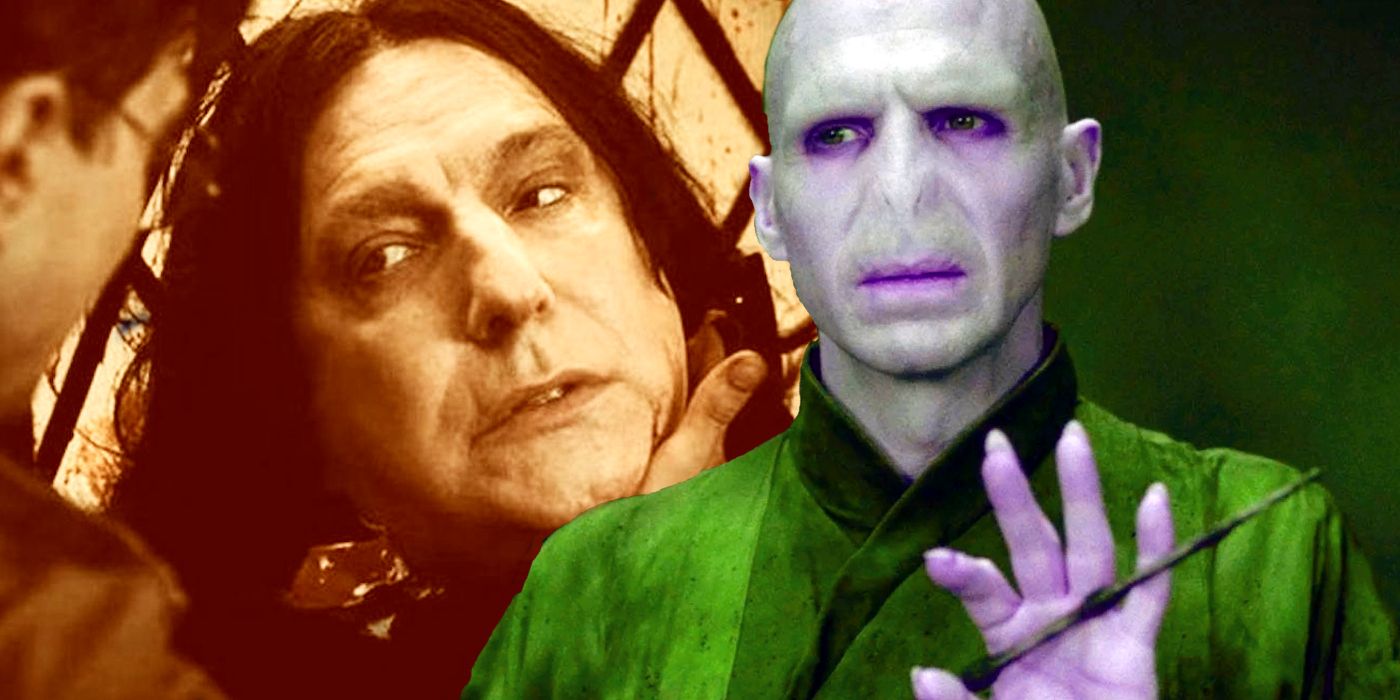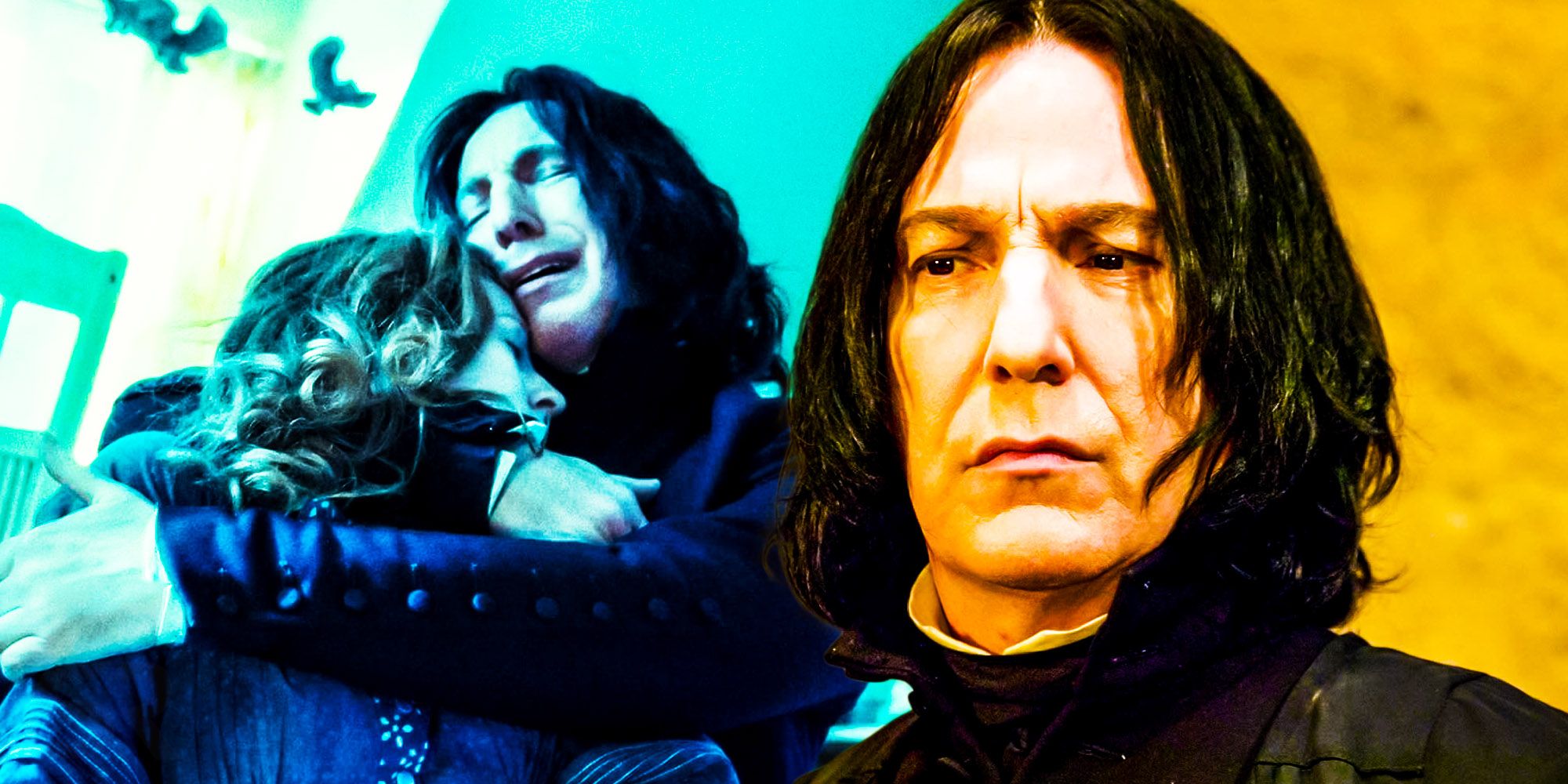The Harry Potter films made changes when adapting the books, but they still couldn’t fix Snape’s redemption arc. The redemption of Severus Snape divided audiences since it was first revealed in Harry Potter and the Deathly Hallows. While some audiences felt Snape being in love with Lily all along excused his horrible behavior, another belief was that it wasn’t enough to justify all the terrible things he did in his life. However, one common thread runs through all the arguments that Snape was redeemed in the last Harry Potter.
Most audience members who believe that Snape was redeemed reference moments from the films that were either new additions or retcons of the book to prove their point. The version of Snape in the Harry Potter movies was vastly different from the book version. Snape was a much better person in the films, and his worst moments were changed or ignored on screen. It was telling, however, that even with all these changes, the redemption of the film version of Snape was still debatable.
Snape’s Bullying & Insults Were Reduced In Harry Potter Movies
The traits most associated with Severus Snape across the Harry Potter franchise were bullying and insulting. Whether in the books or the films, Snape was rude to the pupils of Hogwarts and would purposely treat certain students worse than others. However, the extent of his cruel behavior was less severe in the films. Harry Potter's Snape was biased toward his Slytherin students, delivered a few sarcastic insults, and occasionally handed out punishments to Harry and his friends. This created a characterization of a tough teacher similar to Professor McGonagall.
The Harry Potter books, however, presented Snape very differently. Snape went out of his way to humiliate Harry and his friends, insulting Hermione’s physical appearance, Ron’s intelligence, and almost everything to do with Harry. This extended to others, including Snape trying to get Remus Lupin fired from a job he desperately needed. Snape’s treatment of Neville was perhaps the most egregious, from threatening to kill his pet toad to bullying him to the point he became the young boy’s boggart. Snape had a hard childhood, but there was no justification for treating children that way. It showed that Snape was a bitter and cruel man.
Snape Actually Protects The Students In The Harry Potter Movies
Snape’s underdevelopment in the Harry Potter movies and books was also illustrated by how he supposedly protected Harry throughout the years. In the books, Snape was rarely shown looking after Harry. Instead, Harry, and the reader, were told by other characters in exposition. Such moments of Snape's protection included trying to unjinx Harry’s broom in Sorcerer’s Stone or following Harry, Hermione, and Umbridge into the Forbidden Forest in Order of the Phoenix. By only placing these moments of Snape being brave and protective in the background, it wasn't believable when they were used as examples of how Snape redeemed himself.
The Harry Potter films attempted to show Snape being more proactive in protecting Harry, but they still fell short. The most notable difference was in Prisoner of Azkaban when Lupin transformed into a werewolf in Harry Potter. While in the books, Snape started unconscious and was later more concerned about Sirius’ escape rather than anyone’s well-being, in the film, Snape was shown protecting the trio by shielding them from the werewolf. However, later in the series, there were few scenes with Snape, so there weren't any other examples of Snape protecting Harry to reference. This is an example of a film retcon moment usually used to defend Snape that doesn't work.
Harry Potter Movies Cut The Full James vs Snape Rivalry
One of the biggest arguments in favor of Snape's redemption was that he had a hard childhood, with James Potter bullying him in school. However, the true nature of the James and Snape rivalry was cut from the films. The Harry Potter films instead only showed a select few moments that explicitly reflected James in a negative light. This was done to draw parallels between Snape and Harry and to portray Snape as more sympathetic, but instead, it completely changed both Snape and James as characters.
Unlike in the films, the Harry Potter books explained how both James and Snape would attack one another for no reason, that James disliked Snape due to his interest in the Dark Arts, and that James saved Snape’s life while they were still school enemies. The Pensieve scenes in Order of the Phoenix and Deathly Hallows explaining Snape’s history with James were much more detailed and suggested Snape was just as spiteful as a school kid, if not worse.
Lily & Snape’s Friendship Fallout Was Changed In The Movies
The fallout of Snape and Lily’s friendship was glossed over in the films and was the most glaring example of how the films changed Snape to make him more sympathetic. In the Deathly Hallows Part 2 film, after it was revealed Snape and Lily used to be friends, there was a scene of Lily getting knocked into by James in the hallway. While Snape helped pick up her fallen books, James and Lily shared a look while Snape stared in jealousy before it cut to them as grown-ups. This gave the impression that Lily and Snape grew apart because Lily fell in love with Snape’s bully, but this was far from the case.
In the Order of the Phoenix book, during the flashback scene in the Pensieve, Lily initially stood up for Snape but turned on him after he called her a Mudblood. This was later expanded in the Deathly Hallows Pensieve scene, when Lily realized Snape had bought into Voldemort’s way of thinking concerning Muggleborns and the Dark Arts, with her being the one exception. Lily was disgusted and ended their friendship. Changing these events in the films washed away his mistakes, his horrific beliefs, and his “nice guy” dynamic with Lily and instead made him someone to feel sorry for.
The Dark Reason Behind Snape’s Turn Against Voldemort
The most telling retcon to justify Snape’s redemption occurred in Half-Blood Prince and The Deathly Hallows when the truth was revealed about why Snape turned against Voldemort and became a spy for Dumbledore. In the Harry Potter films, Snape’s time as a Death Eater was glossed over, and instead, they only showed Snape making a pact with Dumbledore to be a spy after warning Dumbledore that Voldemort intended to kill Harry. This was a significant change from what was revealed in the books.
In the Half-Blood Prince book, Harry found out Voldemort learned of the prophecy that claimed Harry was the Chosen One from Snape, who was eavesdropping on Dumbledore and Trelawney when the prediction was made. When Voldemort killed all the Potters, Snape went to Dumbledore and confessed everything, including that Snape asked Voldemort to spare Lily’s life and that he didn’t care if James and Harry were killed. Snape being the reason for Voldemort knowing the prophecy and targeting the Potters, as well as his heartless request to Voldemort, captured exactly the type of man Snape was. It was likely cut from the films to make Snape not look as irredeemable.
Harry Potter's Book Changes Still Don’t Justify Snape’s Redemption
Snape was not Slytherin’s greatest hero, nor did he have a great redemption arc. Even with all the retcons in the Harry Potter films, Snape’s character remained a bitter man and angry that his childhood friend did not return his romantic feelings. He believed and indulged in the Dark Arts and Voldemort’s regime, only switched sides when it was convenient to his wants, and then went on to torment and bully innocent children for several years. While Severus Snape remained one of the most complex and intriguing characters in the Harry Potter series, a closer look suggested his redemption arc was not well-written or justified, whether in book or film format.


